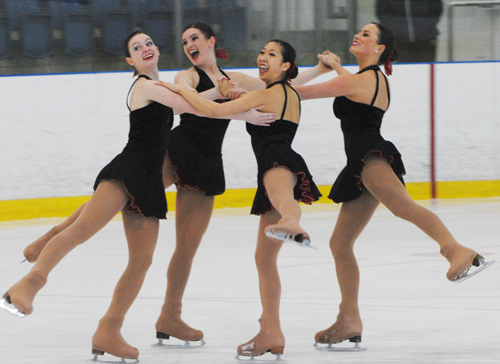
6 a.m.
Most of us are still snuggled under our blankets, but the members of the U of G varsity figure skating team are already on the ice, warming up for another practice. It’s their regular routine. For coach Janet Gibson, this is just the beginning of a day that may include eight to 12 hours on skates before she can head home for the night.
When Gibson took the coaching position eight years ago, the struggling University team was in danger of being shut down. Two years later, U of G figure skaters placed second in the Ontario University Athletics (OUA) finals. Two years after that, they won their first provincial championship. In the synchronized skating section — where 16 skaters from the team all skate together, performing every movement at precisely the same moment – the U of G team has won at the provincial level for the past four years.
Despite their impressive record, Gibson was disappointed when the team did not win either the synchronized skating or the overall title at this year’s OUA finals, especially since they had won the previous competition and placed second in an earlier event against the same schools.
In third place at the end of the first day of competition, the team dropped to fifth on the last day of the OUA finals.
“The skaters worked really hard and skated extremely well. The other teams even said to me that they felt we should have won,” she says. “It’s frustrating, but that’s one of the things about varsity figure skating. I guess this year it wasn’t our time. Maybe next year it will be.”
Those unexpected placements aren’t the whole story, however, as there were still some impressive OUAA wins: U of G skaters won the free skate fours event and placed second in the men’s and second in the women’s free skating events.
While the overall results were not what they’d hoped for, assistant coach Aaron McCullagh says, “The skaters really did the best performances and had great energy. This is what happens sometimes in skating: it’s subjective. This kind of disappointment happened to me, too, when I was competing.”
McCullagh, who is a full-time student in human kinetics, has high praise for Gibson and calls her an inspiration. “When she came here, Guelph was in last place most of the time; she’s turned it into a team to be reckoned with.” The skaters, he adds, are talented and committed. U of G skaters are also required to help with a Learn to Skate program offered to the community and do so happily.
Those 6 a.m. practice times? They don’t bother McCullagh a bit. He started skating at age 10 years and says, “I’ve been doing this so long it feels normal.” The practice time works well with his class schedule, too, as he can finish on the rink at eight and be in a lecture hall half an hour later.
Gibson says she couldn’t accomplish all she does with the team without the help of McCullagh and the other assistant coach, Carlie Roberts, or without the support of the Department of Athletics. “We are treated like any other varsity team, and figure skating doesn’t get that level of respect at some schools.”
Like McCullagh, Gibson started the sport early. In fact, she was just four years old when she first laced up her skates. By age 16 she was on the Canadian national team and stayed there for the next three years. When she went to the University of Waterloo, she skated for their varsity team, but after graduating and earning a teaching degree, she took a full-time teaching job and left the skating world.
“That changed when my daughter decided she wanted to learn how to skate,” says Gibson. “I wanted to be the one who taught her, and that led to doing more and more coaching.” Seventeen years later, she coaches not only the U of G team but other clients and members of local figure skating clubs. “Even though I was focused on teaching for a while, my passion for skating never left me,” adds Gibson. “Figure skating gets into your blood, and you can’t walk away from it.”
It’s not the long hours or cold mornings at the ice rink that Gibson finds most challenging. For her, the toughest part of the job is determining which of the students who try out will make the team, and informing those who don’t get in that they haven’t been given a spot. A minimum of 17 skaters is needed to compete; right now the U of G team has 22. “Sometimes I’ll have rookies who just train with us for the first year,” Gibson adds. “Then they’ll start competing with us the next year.”
Skating team try-outs happen in September, and training starts in earnest shortly after because the first competition is mid-November. That’s not much time to select music and create routines, and for the team to get used to skating together.
“I think this year’s disappointing results will just make us work that much harder,” says Gibson. “We’re fired up to prove that we can do it.” When the students returned home from the competition, she points out they were eager to get back on the ice the next morning. No time to feel discouraged; these skaters are looking ahead to the next time they get a chance to show what they can do.
Click here to read more about the U of G skating team. for the team’s OUA medal summary.
[slideshow gallery_id=”8″]
2012/2013 OUA Medal Summary:
Gold: Pairs Fours (Christine Kucava, Maya Goldman, Anjiuli Dabydeen, Amanda Sproule)
Silver: Amanda Sproule, Senior Silver Free Skate
Silver: Francis Adamo, Men’s Open
Bronze: Maya Goldman & Christine Kucava – Gold Creative Dance
Fourth: Synchro